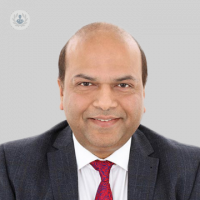How are swallowing disorders diagnosed?
Written by:There are many different reasons why a person may experience difficulty swallowing. It is important to determine the cause and get treatment promptly, to avoid more serious health conditions from developing. Highly esteemed and expert otolaryngologist, Mr Anurag Jain, practising in Buckhurst Hill, London, and Brentwood, discusses some of the main causes, who is most affected, and how the cause is determined to ensure the correct treatment is used.

What health conditions can cause swallowing problems?
Swallowing problems can be caused by a variety of health conditions such as infective conditions like throat infection, neurological conditions like stroke, a motor neuron disease, aging, or a condition such as pharyngeal pouch where there is a pouch at the back of your throat making swallowing difficult. A more sinister pathology, like throat cancer, could also cause swallowing problems so it is essential for you to get it checked as soon as possible. Early detection and correct management of such a pathology make a big difference to the outcome.
Who is mainly affected by swallowing disorders?
Swallowing disorders can affect any age group but it's usually more common in elderly people. It also very commonly affects people with neurological disorders or neurologic conditions like motor neuron disease or cerebral palsy. It can also be an issue for patients with cancer of the throat or oesophagus, for example.
What are the main symptoms of swallowing problems?
The main symptom is difficulty in swallowing. Patients with swallowing problems could be limited to liquids only, or they could have difficulty even getting liquids down. Swallowing disorders are associated with painful swallowing, fever, lumps in the neck, and even loss of weight due to the inability to get adequate nutrition.
What further problems can swallowing disorders lead to?
If there is some kind of obstruction in the food pipe, the food can often be aspirated, meaning it can go down the wrong way or through the wrong pipe into the lungs causing chest infection. This is also seen in a condition called pharyngeal pouch, where there is a pouch bulging from the food pipe, the food collects there and can be regurgitated. When this happens, it can go down the wrong way. Again, it can cause chest infection, but it can also cause weight loss, lack of nutrition, cachexia, or anaemia.
How are swallowing disorders diagnosed?
It begins with finding out the cause of the swallowing problem, so whether it is neurological, anatomical like a pharyngeal pouch, age-related, or if it is a more sinister pathology such as cancer. Diagnosing a swallowing disorder involves a thorough clinical examination including a nasal endoscopic examination, where a camera is placed in a patient's throat to visualise the voice box directly to make sure there is nothing there. Patients might require scans, such as the barium swallow and even an upper GI endoscopy. Once the cause has been determined, then the treatment is carried out appropriately.
If you are experiencing issues swallowing and would like to book a consultation with Mr Anurag Jain, you can do so by visiting his Top Doctors profile today.


